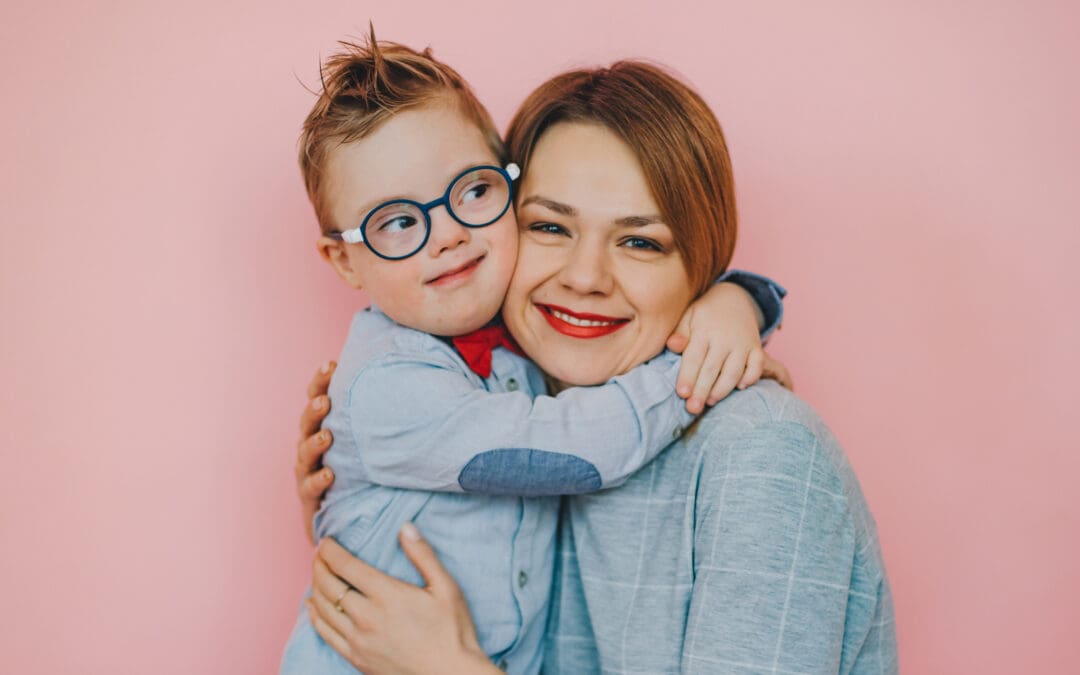I was seventeen years old and moving into my college dorm when I met him for the first time. He was twelve and carrying a plastic spoon that he shook in his hands. He repeated my name a few times, then he repeated his sister Heidi’s name and that she was going to college.
Jamie was the first person I ever met with Down syndrome.
Six months later, I went home with Heidi on a school break. As soon as Jamie saw me, he did something remarkable. He said my name, and then he imitated how I look when I laugh! Not only did he remember meeting me, he remembered something very specific about me!
Year after year, even a decade after my college graduation, every time I saw Jamie, he’d do the same thing. Eventually he grew out of carrying his plastic spoon. His communication abilities continued to improve, and he even started working. Still to this day though, if you ask Jamie who Heather is, he’d likely do a fine imitation of me laughing.
Getting to know Jamie was both a joy and a privilege. I’m grateful to have had the opportunity. There’s something so pure about the hearts of those born with Down’s. They smile, they joke, and they love in an unadulterated way. I want my children to know children like that. I want my children to see that every human life has value and that people who are different than they are can make wonderful friends.
But sadly, there aren’t as many people, globally, with Down syndrome anymore because many, if not most, are being aborted.
In the United States, about 6,000 babies are born with Down syndrome every year. This is about one in every 700 births. But an estimated 67% of pregnancies where the baby would be born with Down syndrome end in abortion. In June, data released by the Department of Health showed a 42 percent increase in abortions for Down’s since 2008 and a 64 percent increase in late-term (after 24 week) abortions of Down’s syndrome babies since 2017. In Canada the rate is likely higher, though there are no reliable studies to prove it.
In Europe, the numbers are even more startling. Abortion rates for babies pre-diagnosed with Down syndrome is greater than 90 percent. Iceland has all but eliminated Down syndrome births””data shows between 2008 and 2012 all babies with Down syndrome were aborted there, while Denmark ranks a close second with 98 percent of these children being aborted. Germany has strict rules about abortion based on disability, but yet 90% of Down syndrome babies are aborted under the guise of a disabled baby affecting the “mental health of the mother.”
But do these families even know what they’re missing? Or, have they been deceived into believing that society is better off without those with disabilities.
A culture that determines only one “type” of person is good and acceptable to that culture is a dangerous place to live. Didn’t the results of Nazi Germany’s eugenics programs teach us anything about valuing human beings?
This month is Down Syndrome Awareness Month. I wonder if more expectant mothers had the opportunity to get to know people like Jamie if they’d be as quick to determine that a child with Down’s would be a liability to their lives.
Yesterday, I saw a 28-year-old Down’s man named Trevor Hendershot on television. He’s a greeter for the Mighty Ducks hockey team in Orange County, California and has worked with his parents to start an organization to have more adults with Down’s greet at professional sporting events across the country. Trevor is a light to his community and a joy to his workplace. But it was his father’s words that struck me the most. He shared how he remembered feeling angry with God when Trevor was first born. He wondered how he deserved a son like this. Now, Bob’s perspective has completely changed. I watched him say the following, “I was right, I didn’t deserve a son like Trevor. But for complete opposite reasons.”
Trevor is a blessing as are all children born with Down’s. Let’s ensure that children like him, babies like Jamie, are welcomed”” not lost to abortion.

